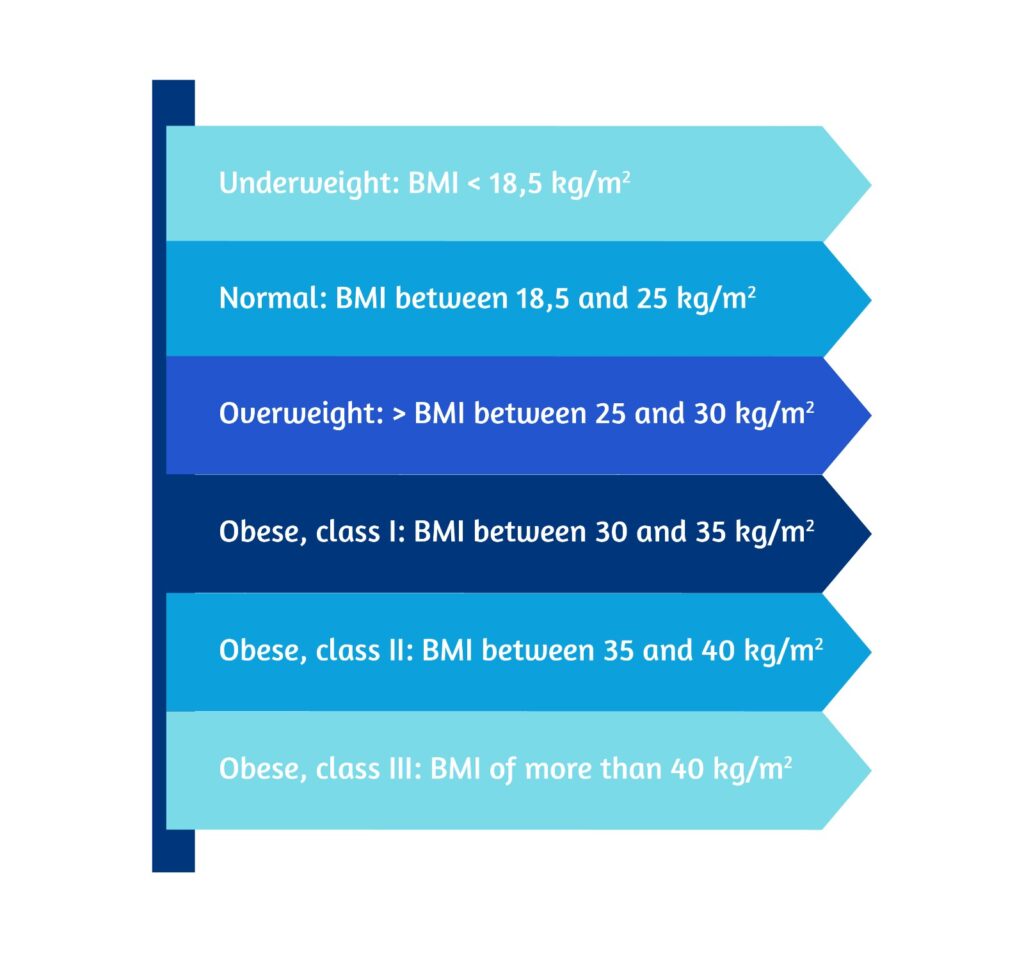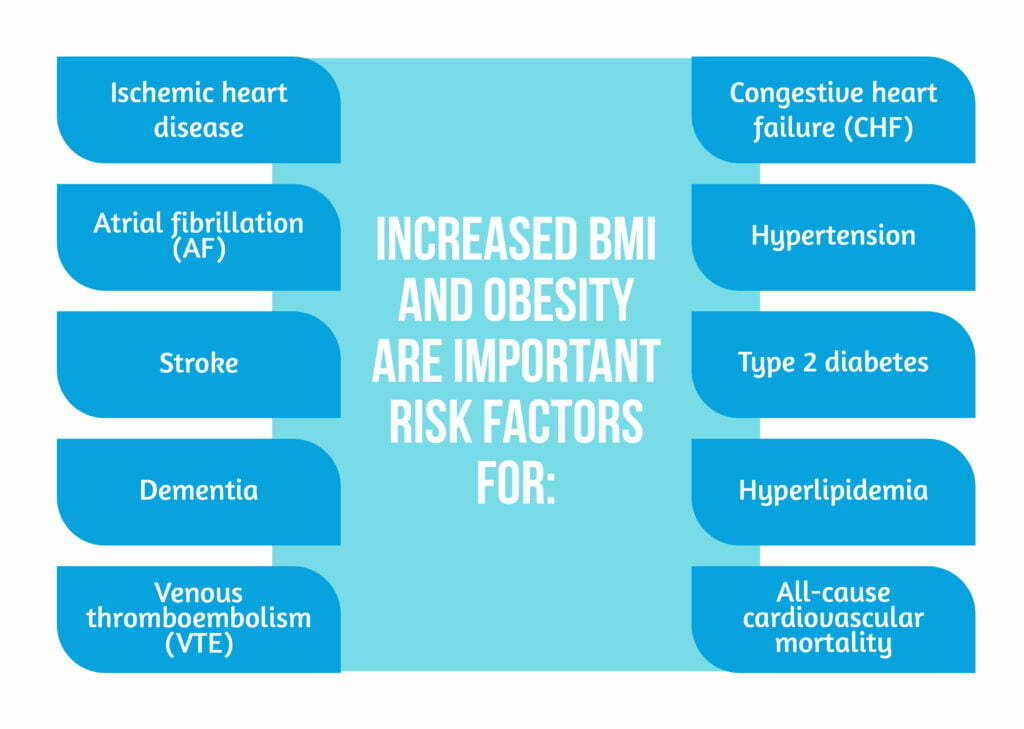Obesity role in stroke prognosis and rehabilitation

Authors: Ioana Stanescu, Oana Vanta
Keywords: obesity, body mass index, stroke rehabilitation, body mass index, prognosis
Introduction – Obesity role in stroke prognosis and rehabilitation
How are overweight and obesity defined? According to World Health Organization (WHO), overweight and obesity are defined as abnormal or excessive fat accumulation that presents a health risk.
The body mass index (BMI) is the indicator used to assess nutritional status, as the WHO recommended. The formula for calculating BMI is a person’s weight in kilograms divided by the square of the person’s height in meters (kg/m2).
Depending on BMI values, a person can be considered [1] as one of the cathegories from Figure 1.

What are the recent epidemiological findings/statistics/rates for body weight and obesity?
The incidence of obesity worldwide is increasing, being 3 times more frequent in 2016 than in 1975. The data provided by the WHO showed that 1,9 billion adults (> 18 years) are overweight and 650 million are obese [2]. Also, a higher prevalence in children and adolescents aged 5-19 is reported [2].
From the world’s adult population:
- 39% are overweight
- 13% are obese
Epidemiological data collected in 2010 in the United States showed that the rate of obesity is climbing [3]:
- Almost 70% of adults are overweight
- 35% are obese.
Does obesity increase stroke risk?
Being overweight is associated with a higher incidence of cardiovascular diseases, including stroke. Overwhelming data show that increased BMI and obesity are important risk factors for the further affections mentioned in Figure 2 [4–5].

Obesity is associated with a higher risk of stroke in both men and women:
- each increase with 1 point of BMI increases relative stroke risk by 6%
- persons with BMI > 30 kg/m2 had a greater risk for ischemic and hemorrhagic stroke [6].
However, some studies hypothesized that patients with increased BMI have a better prognosis for heart diseases than normal-weight patients [7]. The term “obesity paradox” was introduced in 2002 by Gruberg and collab. for patients with ischemic cardiopathy, and was further described for many other cardiovascular diseases, such as myocardial infarction or chronic heart failure [8].
Is body weight important for stroke rehabilitation?
There are few retrospective studies reporting lower mortality rates and better functional outcomes, mostly in overweight but also in obese patients, suggesting the existence of the ‘’obesity paradox’’ in stroke. Other studies contested the protective effect of increased body weight in stroke survivors, showing that overweight patients have more functional decline after stroke than normal-weight patients, more impaired mobility, higher risk for complications and a worse outcome [9–10].
The existing evidence shows contradictory facts, and further studies are needed to clarify the relationship between stroke recovery and body weight [11].
A large trial was performed on more than 800 patients with stroke hospitalized in a rehabilitation unit. The study hypothesis was that body weight did influence the recovery outcome. After measuring height and weight, the MBI was calculated for each patient. According to their weight, the patients were divided into underweight, normal, overweight and obese. Stroke severity and disability degree were also assessed by specific scales.
At the end of the treatment, the efficiency of the rehabilitation program for patients’ disabilities was measured by a standardized scale, the Functional Independence Measure (FIM) [12].
Do overweight patients have a better functional recovery after rehabilitation?
The results of the above-mentioned study are arguments for the ‘’obesity paradox’’ in stroke. A better functional outcome was noticed in the overweight group of patients. These patients had the highest efficiency in the training program compared to other patients.
The obese patients have, paradoxically, the same degree of functional recovery as the underweight patients. All patients improved their motor functional FIM scores after completing the rehabilitation program.
Concerning the cognitive parameters of the FIM score, the highest improvement was noted in the overweight group. The normal weight group performed better than the obese group on cognitive gain.
This study concluded that the body weight of stroke patients did influence the results of the rehabilitation, and the overweight patients benefit the most [12].
This study has limitations, and the authors acknowledge the retrospective study design, which may restrict the results. Also, the use of the BMI is not the best way to assess a patient’s health status as BMI does not distinguish between fat and fat-free, raising some concerns about its use as a unique weight parameter [12].
Conclusion
Body weight is an important health factor, according to the WHO. The incidence of overweight and obesity is increasing in the general population. This could be followed by an increase in the burden of cardiovascular events and stroke. The evidence for a more favorable outcome for overweight patients is controversial.
Some studies have demonstrated a worse prognosis and an increased number of complications in stroke patients with a high BMI. Being obese has a negative impact on stroke evolution and prognosis. Other studies have found lower mortality rates and better functional outcomes in overweight stroke patients.
A study performed on a group of inpatients admitted to a stroke rehabilitation hospital showed that the degree of recovery is influenced by body weight. Surprisingly, overweight patients have the highest functional improvement. The treatment efficacy is better in this particular group, and at the end of the intervention, these patients have a lower disability. Also, cognitive parameters are improved, especially in overweight patients. Underweight and obese patients have the smallest functional recovery after treatment compared to normal-weight patients.
While obesity is a well-known risk factor for stroke, a number of studies reported a better outcome after rehabilitation treatment in overweight stroke patients may have a better outcome. This is an argument for intensive rehabilitation training for overweight people and motivation to accomplish the treatment goals.
For more information related to stroke, visit
Can gaming therapy impact post-stroke rehabilitation?
Recovery of precise hand movements after stroke
References
- World Health Organization. (n.d.). A healthy lifestyle – who recommendations. World Health Organization. Retrieved April 10, 2023, from https://www.who.int/europe/news-room/fact-sheets/item/a-healthy-lifestyle—who-recommendations
- World Health Organization. (n.d.). Obesity. World Health Organization. Retrieved April 10, 2023, from https://www.who.int/health-topics/obesity#tab=tab_1
- Flegal KM, Carroll MD, Kit BK, Ogden CL. Prevalence of Obesity and Trends in the Distribution of Body Mass Index Among US Adults, 1999-2010. JAMA. 2012;307(5):491–497. doi:10.1001/jama.2012.3
- https://www.who.int/news-room/fact-sheets/detail/obesity-and-overweight
- Virani SS, Alonso A, Aparicio HJ, Benjamin EJ et al. American Heart Association Council on Epidemiology and Prevention Statistics Committee and Stroke Statistics Subcommittee. Heart Disease and Stroke Statistics-2021 Update: A Report From the American Heart Association. Circulation. 2021;143(8):e254-e743. doi: 10.1161/CIR.0000000000000950.
- Brown CV, Neville AL, Rhee P, Salim A, Velmahos GC, Demetriades D. The impact of obesity on the outcomes of 1,153 critically injured blunt trauma patients. J Trauma. 2005 Nov;59(5):1048-51; discussion 1051. doi: 10.1097/01.ta.0000189047.65630.c5.
- Ray DE, Matchett SC, Baker K, Wasser T, Young MJ. The Effect of Body Mass Index on Patient Outcomes in a Medical ICU. Chest.2005; 127(6): 2125-2131, ISSN 0012-3692, https://doi.org/10.1378/chest.127.6.2125.
- Gruberg L, Weissman NJ, Waksman R et al (2002) The impact of obesity on the short-term and long-term outcomes after percutaneous coronary intervention: the obesity paradox? J Am Coll Cardiol 39:578–584. https://doi.org/10.1016/s0735-1097(01)01802-2
- Kalichman L, Rodrigues B, Gurvich D, Israelov Z, Spivak E. Impact of patient’s weight on stroke rehabilitation results. Am J Phys Med Rehabil. 2007;86(8):650-5. doi: 10.1097/PHM.0b013e318115f41b.
- Stevens-Lapsley JE, Petterson SC, Mizner RL, Snyder-Mackler L. Impact of Body Mass Index on Functional Performance After Total Knee Arthroplasty. The Journal of Arthroplasty. 2010; 25(7):1104-1109, https://doi.org/10.1016/j.arth.2009.08.009.
- Forlivesi S, Cappellari M, Bonetti B. Obesity paradox and stroke: a narrative review. Eat Weight Disord. 2021;26(2):417-423. doi: 10.1007/s40519-020-00876-w.
- Burke DT, Al-Adawi S, Bell RB, Easley K, Chen S, Burke DP. Effect of body mass index on stroke rehabilitation. Arch Phys Med Rehabil. 2014;95(6):1055-9. doi: 10.1016/j.apmr.2014.01.019.
* Image reference: Ayrton A., Overweight woman standing on scales. <https://www.canva.com/>.









